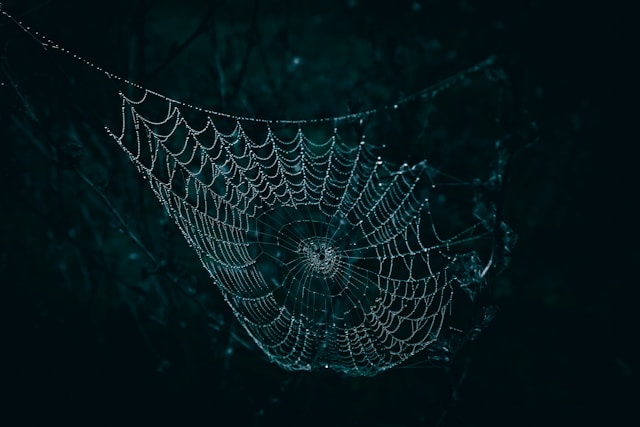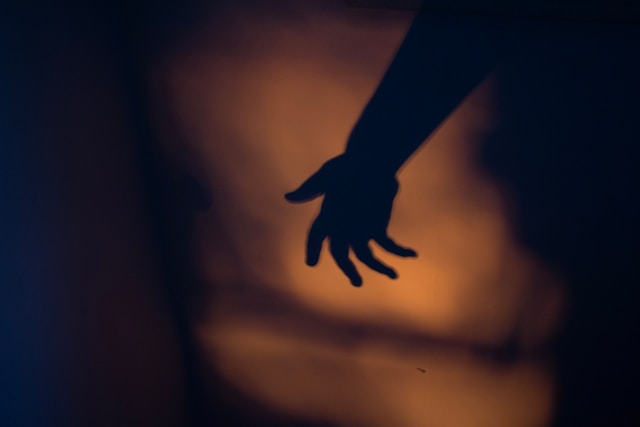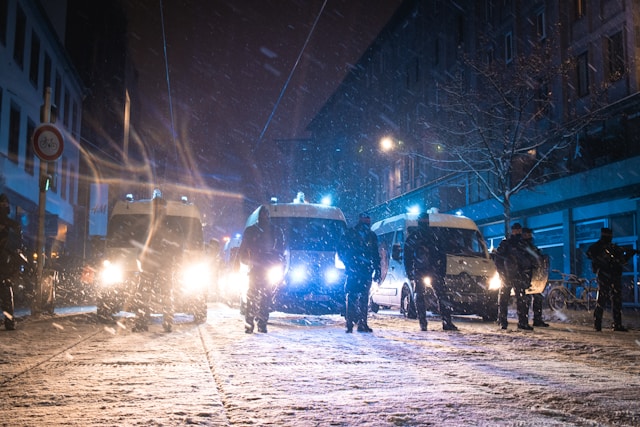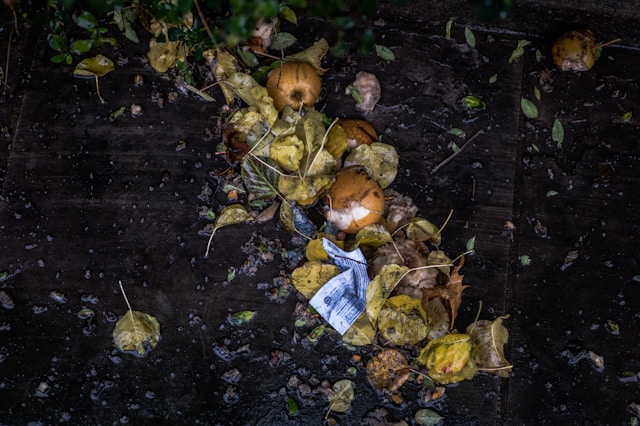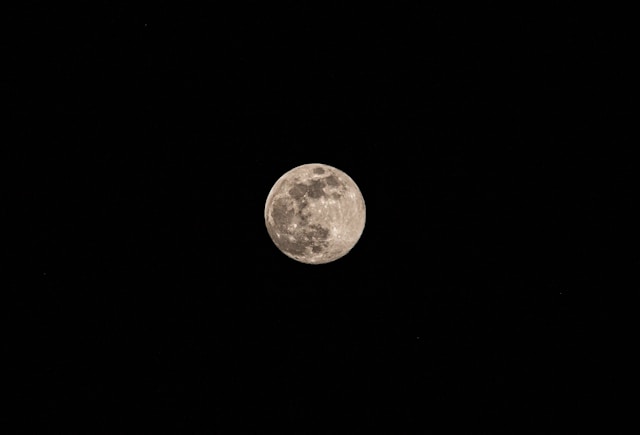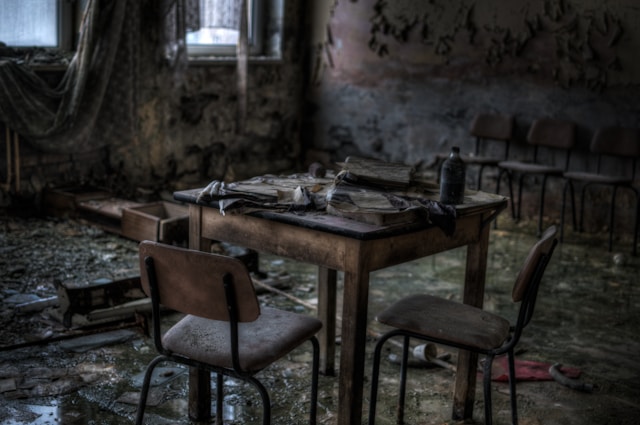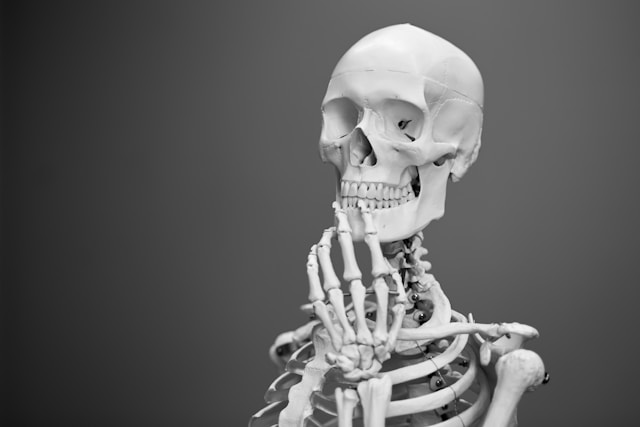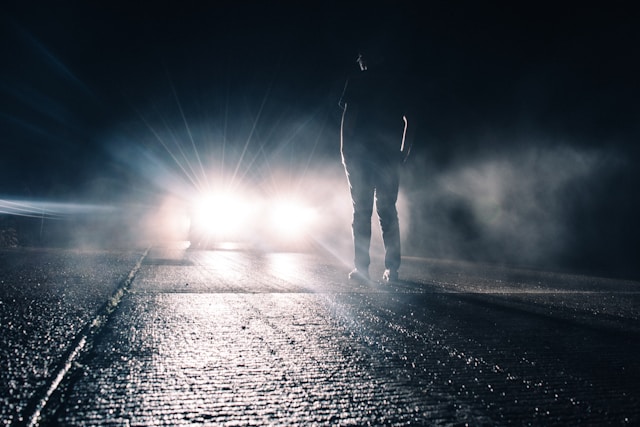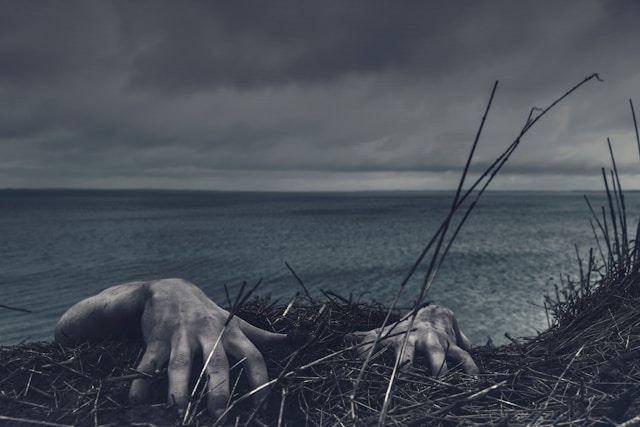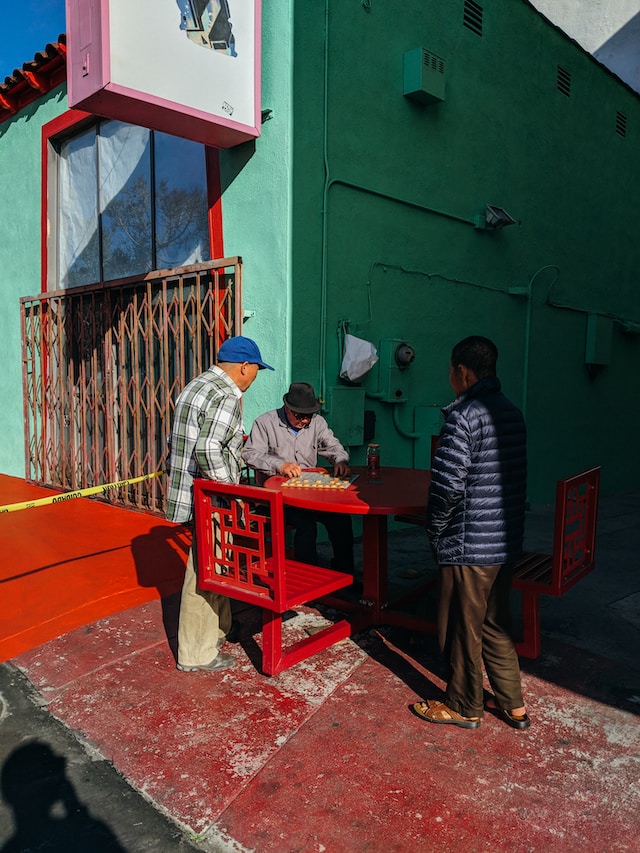There was one house on Sleepy Eye Road that didn’t decorate for Halloween. It was a two-story, maroon house that seemed to absorb sunlight and color—windows always shuttered and dark. Decorations never adorned the front yard for any holiday, and Halloween was not the exception, despite the teenage vandals living in the neighborhood.
Strolling down the street, Katie Murray saw the elm trees in the front yard were bedecked in streams of toilet paper. She slowed to a stop.
The owner of the house, Miss West, was someone the women in Mrs. Murray’s book club frequently discussed in hushed tones. Katie had never seen Miss West, but she knew from eavesdropping that none of the ladies in the neighborhood thought well of her.
For a minute, Katie stared at the maroon house on the other side of the road. Then she looked both ways and crossed the street.
The air grew colder closer to the house. Katie swallowed her trepidation. Maybe there was a reason Miss West hadn’t removed the toilet paper hanging from her trees. Was she even aware of the prank? Katie had no idea what she was going to say as she climbed the porch steps and rang the bell. Who would answer the door? Was Miss West a reclusive crone, or was she someone closer to Mrs. Murray’s age?
Katie’s heart jumped into her throat when the door opened. The aperture was only wide enough to allow one huge, round eye the color of cream soda to peer outside. In her haste to retreat, Katie tripped over a loose shoelace and nearly fell down the steps. The eye blinked.
“What do you want?”
“Uh…” Katie dropped her gaze to her shoelaces. “Someone TP-ed your yard. I just wanted to make sure that you knew.”
The eye narrowed. “Was it you?”
“No!” The eye narrowed more. Katie swallowed. “If it was me, why would I tell you about it?”
The eye stared at her, contemplating. “Fine, I believe you.” The door opened wider, and the owner of the large eye disappeared behind it. “Come in.”
Katie hesitated. Mrs. Murray wouldn’t want her to enter Miss West’s house, but she also wouldn’t want Katie to be rude. Her internal debate went on so long that eventually Miss West chuckled. It was a rich, smokey sound that seemed to darken the front hallway.
“I’m the neighborhood pariah,” Miss West pointed out. “If you went missing, mine is the first house that would be searched. Even if I was so inclined, I would have to be a special kind of idiot to try anything.”
Cautiously, Katie stepped over the threshold. The front door creaked and swung shut. As her eyes adjusted to the dim lighting, Katie saw a pale hand emerge from the darkness.
“Elspeth West.”
A shiver trickled down her spine when she shook her neighbor’s icy hand. “I’m Katie Murray.”
The floor groaned as Elspeth led her deeper into the house. “Nice to meet you, Katie. You like apple cider?”
The kitchen was lit by dusty fixtures hanging from the ceiling. Piles of mail were stacked precariously and took up more than half of the table; Katie chose to sit at the one uncluttered corner.
Elspeth West cut a striking, hourglass figure even in a champagne-colored bathrobe. Inky hair fell in loose waves past her shoulders. She had the flawless and pale complexion of a doll. Her eyes were big and round like glass marbles. Elspeth stood by the stove, tending to a pot on the burner. The steam rising from it smelled like apple pie.
“Grab the strainer and hold it steady over the sink, would you, Katie?”
Somehow, Katie located a colander amid the heap of dirty dishes. She held it over an empty pot while Elspeth carefully poured and strained the homemade concoction. Then her host filled two chipped mugs to the brim. They sipped their apple cider and stared at each other.
Eventually, Elspeth said, “You must be a brave kid to come to my door all by yourself.”
“I’m not that young,” Katie retorted. “I’m almost thirteen.”
Elspeth’s red lips curled into a smirk. “Take it from someone who hasn’t been twelve in many years—that’s younger than you think it is.”
Katie hummed into her mug. The minutes passed in more silence and, just to ease the tension, she asked if Elspeth wanted help cleaning up the toilet paper. The woman tapped her manicured nails against the ceramic cup in her hands.
“If I leave it, would it deter any more pranks this Halloween?”
Kaite wrinkled her nose.
Elspeth laughed. “That look speaks volumes. Thank you for the offer, Katie, but I’ll take care of the toilet paper in my own time.”
Looking around, Katie noticed that Elspeth’s house appeared much older than any of the others on the block. From the light fixtures to the wallpaper, it was all vintage—the dusty, moldy kind of vintage. She wouldn’t be surprised to learn that nothing in Elspeth’s house had been updated since the Vietnam War.
“Your offer gives me an idea, though.”
Katie was jolted out of her musings, startled to find her host studying her.
“I could use help decluttering this place.” She gestured to the messy kitchen. “The rest of the house is more of the same. If you’re interested in a job, I’d pay you.”
“Oh…I don’t know. I’ve got school and my friends…”
But it would be nice to have spare cash. A job equaled shopping money. Elspeth flicked her hand dispassionately.
“The schedule would be up to you. If you have a free hour or two, I keep a spare key taped behind the left porch light.”
Finished with her apple cider, Katie stood and took her mug to the sink. “I’ll think about it,” she promised.
***
Katie told no one about the job offer. If she discussed the opportunity with her parents, the answer would be an unequivocal no. If she told her friends about it, they would pressure her to accept just for the opportunity to snoop.
It was a rainy October day when Katie made up her mind.
“Mom! I’m going over to Mikayla’s house! My homework’s done!”
She didn’t have Elspeth’s phone number, so Katie decided to take her neighbor at her word and use the spare key. On the short walk to the maroon house, the rain froze her fingers. She noted, as she ran up to the porch, that the toilet paper had been removed from the elm trees. A good thing too, since the rain would have made a mess of it. She had to stand on her tiptoes to reach behind the left porch light; her hands were so numb that she almost couldn’t peel back the tape. She was shivering and half regretting her decision by the time she fumbled her way inside.
It wasn’t much warmer indoors, but at least it was dry. Katie toed off her muddy shoes, leaving them by the door, and hung her red raincoat over the newel post of the staircase. She hadn’t been quiet coming in, yet Elspeth did not come to investigate the noise.
“Hello? It’s Katie Murray! I decided to help clean your house!”
The old house creaked and groaned in the wind.
“You told me where the spare key was, so I figured it was okay to just…come in.”
Still no response. Well then, she would take the initiative to start in the kitchen. Katie had already been in that room, and it seemed fairly easy to figure out where things went.
First, she looked through all the drawers and cupboards to familiarize herself with the layout. In her exploration, she discovered a drawer of plastic bags, tinfoil rolls, and baking sheets. In one of the larger cupboards was a stack of unused lids missing their pots. The only cupboard that was neat and organized was the one containing herbs and spices.
On a whim, Katie opened the refrigerator. The shelves were mostly bare. A big plastic container of spinach leaves took up the most space, then a gallon of whole milk, and a glass receptacle filled with bloody strips of meat. Grimacing, Katie closed the door.
Next, she tackled the dirty dishes. Katie dove in, armed with Dawn soap and red rubber gloves.
Spotting an old radio half buried under the mail, Katie shook the suds off of the gloves and turned it on. The speakers crackled and filled the room with the lively music of a big band ensemble. Once she fell into a rhythm, the washing went quickly. Sooner than she expected, the job was done.
The other giant mess in the kitchen was the mountain of envelopes that threatened to become an avalanche at the slightest shift in the air. She felt weird looking through Elspeth’s mail, but maybe she could just remove what was obviously junk. Doing that made things a little neater. Katie took the junk mail to the recycling bin by the hutch. Before leaving, she found a pen and a notepad:
Decided to take the job. Washed dishes & recycled junk mail. Will come back next Friday after school.
-Katie M.
Exhausted from an afternoon of physical labor, Katie dragged her feet all the way home.
***
Next Friday was unseasonably warm. Under the pretense of spending time with a friend, Katie made her way to the maroon house down the block. With the toilet paper gone, some kids had taken it upon themselves to spray Elspeth’s trees with pink and green Silly String. She really hoped Elspeth didn’t ask her to get rid of it; even though a whole week had passed since she cleaned her neighbor’s kitchen, Katie was still afflicted by the same nagging fatigue.
As soon as she rose on tiptoes to grab the key behind the porch light, the front door swung open. Once again, Elspeth remained hidden behind it.
“Hello, Katie M. Won’t you come in?”
The entryway was a mouth of yawning darkness. Katie stepped over the threshold with a shiver. Black spots danced before her eyes now that she was out of the sun. When her vision adjusted, she saw Elspeth walking down the hallway.
“Good job with the kitchen last week. Sorry I wasn’t here when you stopped by, but you’re welcome to let yourself in whenever you please. The good news is that I now have cash to pay you!”
She led Katie to a living room warmly lit by a tall floor lamp in one corner and a squat lavender lamp by a musty beige couch. A tornado of old books, photo albums, and newspapers had torn through the room. Katie coughed on the dust that swirled in the air.
“I know,” said Elspeth, putting her hands on her hips. “It’s bad.”
Today, her neighbor wore a red bandana around her hair, gray sweatpants, and a faded flannel shirt. Even dressed down, she was still the most elegant person Katie knew. Elspeth set two cardboard boxes on the couch and pointed to one of them.
“Garbage.” She pointed to the second box. “Keep.”
“What do you want to keep?”
“The newspapers can all go. Most of the books I’ll keep but need to organize. Photos are on a case-by-case basis.” She eyed Katie, who was rolling up her sleeves. “Got to say, I’m a little surprised a preteen girl doesn’t have anything better to do on a Friday afternoon.”
Katie hid her flushed cheeks by grabbing a stack of yellowed newspapers under the coffee table. “My friends have been pretty busy ever since school started.”
Truthfully, her friends had grown distant. After summer vacation ended, they got new hobbies, new interests, and new friends. None of them wanted to ride their bikes anymore; they wanted to do grownup things that cost money. Money they were suddenly earning, and Katie wasn’t. Not until now.
Elspeth cast her a knowing look. “I remember being that age. Having no idea who I was, yet trying to convince everyone that I had everything figured out.”
Katie changed the subject. “My friends think your house is haunted.”
Her neighbor laughed. “All houses are haunted.” She tossed two leather-bound books into the Keep box. “Just not by ghosts.”
Whatever that meant.
Katie began flipping pages in a scuffed photo album. All of the pictures were faded black and white photographs, the subjects of which were women. Women who looked exactly like Elspeth, just from different eras. She placed the album on the coffee table for her neighbor to inspect.
“Are these your relatives?”
Upon seeing the pictures, the woman smirked. “The family resemblance is strong in the West women.”
Katie frowned. “Where are the West men?”
“In there.” Elspeth dismissively pointed to something on the floor.
Following the woman’s finger, Katie looked over her shoulder at an old shoebox. It was filled with loose, unprotected photographs. Some were clearly no more than a decade old, but most were black and white. Picking up one of the older pictures, she turned it over. In looping cursive, someone had written the names of the people in the photo as well as the date it was taken. Claudia W—that must have been the woman dressed in her Sunday best. Which meant that the man standing beside her was Arthur H.
“Elspeth, why are the boys in a shoebox?”
“All the West women are long-lived,” the woman replied as she paged through the album Katie had given her. “The men, not so much. They all fell prey to illness or accidents, leaving their wives widowed and so heartbroken that they couldn’t bear to see any reminders of their late husbands.”
“What about you?”
Surprise nearly knocked Elspeth off her feet. “Me? No, I’ve never been married, much to my mother’s embarrassment. Although lately, I have been considering the benefits of matrimony.” She flashed Katie a grin and winked. “Like a shared bank account and a tax deduction.”
Katie chuckled, but something inside of her twisted into a knot. This conversation reminded her of something one of Mrs. Murray’s friends called Elspeth during a book club meeting. Maneater, Mrs. Stanton had said, lowering her voice. Then she commented on how Elspeth went through men more frequently than the Stanton family went through groceries, and the other women twittered in guilty amusement.
When Elspeth brushed off an old record player, Katie sneezed. All the dust was giving her a headache. Her neighbor dropped the needle on a vinyl, and she danced around Katie as they continued to sort through junk. At one point, she grabbed Katie’s hands and twirled her, which had both of them giggling.
On Katie’s way out the door, Elspeth handed her a wad of twenty-dollar bills. Katie’s eyes were bigger than golf balls as she stared at the money and stumbled down the porch steps. There was at least a hundred bucks here! Her headache was suddenly relegated to the back of her mind as she counted down the days until next Friday.
***
When Katie arrived at the maroon house the following week, Elspeth was gone again. The afternoon was overcast and dry, the wind wickedly sharp as it whipped through Katie’s hair relentlessly until she pushed the front door shut. It was a relief to be indoors, although she still didn’t feel very good. The headache that had blossomed in Elspeth’s dusty living room had not left Katie in the days between visits. The subtle pain had pulsed in the back of her head all week, driving her to distraction and brewing a caldron of nausea in her stomach. She hadn’t felt well enough to eat anything for breakfast or for lunch, but now her empty stomach gurgled.
Elspeth wouldn’t mind if Katie raided her kitchen for a snack, would she? The hunger clawing at her stomach made up her mind for her.
The cupboards were just as bare as they were the day she cleaned the kitchen. Katie didn’t hold out much hope for the fridge, but she checked anyway. If not for the hunger that clawed at her stomach, her eyes would not have lingered on the container of bloody meat strips. From the shriveled, discolored look of them, they were the same meat strips from Katie’s first visit. It wasn’t an appetizing sight, and yet…
Before she knew it, the container was in her hands, and she was prying off the lid. A stale, gamey odor wafted into her face, something that should have made her gag.
She dipped one finger into the meat juice and then popped it in her mouth. Belatedly, she realized what she was doing even as her stomach rumbled happily. Katie rushed to replace the lid and shoved the container back into the fridge. In her hurry to distance herself from Elspeth’s refrigerator, she stumbled into the adjacent wall. The impact made a faint and hollow sound, and the wall shifted slightly. Curious, she pushed on it again.
The wall moved.
It was a pocket door, she realized as part of the wall slid into itself. She hadn’t noticed it when she was drinking cider with Elspeth or washing the dishes—probably because the pocket door was painted the same off-white color as the kitchen walls. The space beyond was a short, narrow hallway that appeared to be a dead end. She edged into the dark space and felt the wall for a light switch, but there wasn’t one. The ambient light from the kitchen was bright enough to illuminate the vague silhouettes of a bare mattress and a metal bucket.
Wide-eyed, Katie stepped into the room and stared at the bare brick walls, the lumpy mattress, and the rusty bucket and wondered what she was seeing.
As she moved foward, the kitchen lights behind her hit a spot on the wall just above the mattress. There was a word scratched into the bricks. She lowered herself to her knees to see it better. It wasn’t just a word—it was a name. Someone had clumsily and painstakingly scarred the wall by scratching the name Arthur into it.
Arthur…Why did that sound familiar?
“I see you found the pantry.”
The soles of Katie’s shoes squealed, she whipped around so fast. Elspeth loomed behind her, hands clasped at the small of her back. Her round eyes appeared especially huge backlit by the kitchen, while the harsh shadows carved out her features in sharp angles and concave dips. It took several heart-stopping seconds to realize that Elspeth wasn’t upset; there was an amused twist to her lips as she stepped away from Katie.
Under the bright ceiling lights, the shadows vanished from her features, and Katie felt a bit warmer. Walking to the counter, the woman took a ginger root out of a canvas grocery bag.
“Want to try an apple-ginger fizz?”
Once again, Katie found herself seated at Elspeth’s kitchen table drinking something that tasted of sweet apples, this time with a little ginger added to it. The bubbles did wonders to settle her stomach. Elspeth hadn’t bothered to close the pocket door, nor had she taken off her wool trench coat; between that and her powder pink lipstick, she reminded Katie of Audrey Hepburn.
“I would ask if this is a social call or if you came to work,” the woman said as she poured club soda into her glass, “but I sense you have questions about the architecture of my house. Understandable given how that looks.”
She casually waved at the previously hidden doorway.
“It looks like a cage,” Katie said in a hoarse voice.
“My grandmother Claudia West lived here before me, and she had an ill-tempered Doberman Pinscher. Whenever she had company over, she locked him in there with his favorite toy and a pail of water.”
“What was that room originally supposed to be?”
Elspeth’s high heels clicked on the floor. “I think it was once a discreet hallway for caterers to bring food into the kitchen without being seen by guests. But then my grandmother reached a certain age when hosting events became impractical. Truly though, I don’t know for certain what this hallway was for or when the other end of it was bricked up.”
Katie raised an eyebrow. “And you call it the pantry?”
Elspeth’s grin took on a secretive edge. “Family joke. But I promise that it is no longer in use.” Sipping her drink, she walked to the table and gently touched Katie’s cheek. “You’re looking a little peaky today, Katie. Don’t worry about cleaning; you should go home and rest. Maybe eat something.”
“Are you sure?” she asked as she pushed aside her empty glass.
“Absolutely. My messy house will still be here next week.”
Elspeth walked her to the door, but on the porch, Katie paused. “Elspeth…Was your grandma’s dog named Arthur?”
When Elspeth hesitated to answer, the apple-ginger fizz in Katie’s stomach started to creep up her throat. Then her neighbor smirked, as if Katie was now in on the family joke. “Good guess,” she said and then closed the door.
***
Her day off did not make Katie feel better. She merely traded nausea for a bloated stomach. She felt like a balloon as she attempted to stuff her legs and hips into her jeans. Maybe moving around would ease her troubling symptoms. She felt bad that she hadn’t done any work yesterday—even though Elspeth was the one who sent her home—so Katie went back that Saturday afternoon. To combat the gray skies threatening bad weather, she grabbed her red raincoat.
Lingering on the other side of the street, across from Elspeth’s house, were four boys on bicycles. Katie recognized them as other neighborhood kids, though she didn’t know them very well. As soon as she came within view, they dropped their voices and side-eyed her. Goosebumps rippled up her arms, and she was exceedingly glad that she didn’t have to wait for Elspeth to answer the door.
All was quiet within the house. There was no telling whether Elspeth was home, hiding in one of her dusty rooms, or if she was out. Taking off her coat, Katie hung it on the newel post and headed upstairs. She noticed that the air felt thicker up there. In the heavy silence, she heard her own slightly-labored breathing. It briefly crossed her mind that maybe she wasn’t supposed to go upstairs, but Elspeth hadn’t told her that any places were off limits.
On the landing, Katie peered down a long hallway. The window at the end of the corridor should have allowed natural light to brighten all of the nooks and crannies. However, the glass had old newspapers pasted over it, muting any light that attempted to enter.
Who covered their windows with newspaper?
Katie crept down the hallway, peeking into rooms with open doors. Most were dusty bedrooms, cold and unused.
One room wasn’t dusty. Puzzled, she entered, wincing at every creaky floorboard. There was a funny smell in the room. Kind of like a nursing home but worse. Katie pulled the collar of her shirt over her nose.
The mattress was bare except for a plastic protector. The windows were all newspapered just like the one in the hallway. Inhaling as little as possible, Katie approached the bed. A string hung above the headboard, directly over a flat pillow. Her gaze followed the string up to and across the ceiling where it disappeared into the wall.
Her hand rose, as if manipulated by an invisible puppeteer, and pulled the string.
The tinkling of a bell rang somewhere else in the house. Heart in her throat, Katie dropped the string and turned to flee. She hastily stumbled out of the room and into something tall and solid. Katie looked up into the gaunt face of a ghost.
“Ah!” The ghost flinched, and Katie saw something familiar in those big, bulbous eyes. “Elspeth?”
Her neighbor was a shadow of the woman she saw yesterday. Dressed in an old pair of sweats, hair lank and unwashed, she appeared sickly. Her complexion lacked any color, and she somehow seemed much thinner than she was the day prior. Bony fingers plucked at the hem of her sweater as Elspeth regarded Katie with an empty gaze.
“It isn’t Friday,” she spoke softly. “You always come on Friday.”
“I…I felt bad that I didn’t do anything yesterday, so I came again today.”
Elspeth’s fingers twisted in her sleeves. “I wasn’t expecting you,” she murmured. Wary of her neighbor in a way she hadn’t been since Elspeth had invited her into her home, Katie retreated a step.
“If you don’t feel good, I can come back another time.”
“No.” Elspeth sighed. “You’re here. Might as well have you prepare the guest room. You see, I’m having company over tomorrow.”
“Oh…okay. Do you want to maybe lie down for a while?”
“Yes,” Elspeth replied in a dreamy voice. “I think I will, since you already found the guest room.” With a limp hand, she gestured to a narrow door. “Cleaning supplies are in the closet.”
Elspeth drifted down the corridor, like a brittle autumn leaf caught in the breeze. Flustered heat rose to Katie’s cheeks when she saw a long blood stain starting at the crotch of Elspeth’s sweatpants going all the way down to her knee. Katie stared at her until she rounded the corner and disappeared.
In the closet, she found a cleaning solution and dust rags. She didn’t think that would be enough to get the stink out of the guest room, but she would give it her best try.
Her bloated and achy stomach slowed her progress; Katie shuffled around the room and ignored how her body didn’t seem to fit anymore. By the time she was done, the room didn’t look or smell any different. Why was Elspeth going to put her guest in this room? Katie had seen many other unused bedrooms that didn’t have such an off-putting odor. Did it have something to do with the bell?
The only thing she wasn’t able to do in the guest room was put clean sheets on the bed; the closet Elspeth showed her didn’t contain linens. Not wanting to leave the job unfinished, Katie went in search of her ailing neighbor.
The second floor of the maroon house was a maze of drab hallways. It didn’t seem possible that there were so many corridors and bedrooms. When she suddenly walked into a lamp-lit room, the difference was momentarily blinding. It took a minute for her eyes to stop watering, but then she was dumbfounded to see that she had somehow made her way to the living room on the first floor. Impossible, Katie thought. She hadn’t gone down a flight of stairs…
A guttural moan from the other side of the room drew her eyes to Elspeth. The woman was more like a husk than a person, deflated, sunk into the couch. Pale and limp, she looked miserable.
“Hello, Katie,” she murmured, her eyes half lidded. “I would pay you, but I seem to have misplaced my wallet.”
“No, it’s okay. Don’t get up. I just wanted to know where the clean sheets are for the guest room.”
“Don’t worry about it.”
Katie turned to leave, but a certain feeling wouldn’t leave her. She pivoted to face her neighbor again.
“Um, Elspeth? That guest room…what’s with the bell on the string?”
The woman took a long, rattling breath.
“My great-grandmother was bedridden at the end of her life. That used to be her room. She rang the bell to get the servants’ attention. She was relentless with it.”
Katie supposed that made sense, though it didn’t explain the plastic mattress protector.
In a raspy voice, Elspeth said, “I’ll pay you next time, Katie. Thanks for coming over.”
“Are you sure you’re okay? I can call someone for you.”
Like an ambulance.
Elspeth shook her head, her joints creaking. “But if you could bring me something to eat, I would be indebted to you.”
“Sure! You want a bowl of chicken-noodle soup or something?”
“No, no. There’s a little leftover stew in the fridge and enough spinach leaves for a small salad. Don’t worry about any of the dressings.”
The most noticeable change inside the refrigerator was the absence of bloody meat strips. Katie didn’t see any stew, but it could be in that small travel bowl. She picked it up and removed the lid. Inside the bowl was a soupy substance the color of old gravy and slathered over chunks of rare meat. Both the sight and the smell should have been odious, but Katie’s taste in food had taken a bizarre turn lately. The rarer the meat she consumed, the more ravenous she felt.
Katie put the stew in the microwave and plated the last of the spinach leaves. Delivering the meal to the living room, she had just set the plate and bowl on the coffee table when Elspeth’s bony hand suddenly latched onto Katie’s arm. Elspeth stared at her with watery eyes as her sharp nails dug into Katie’s flesh.
“You’re such a good girl,” Elspeth whimpered. “You shouldn’t be here.”
Katie swallowed. “What do you mean?” Elspeth yanked her closer. A feverish blush colored the woman’s cadaverous cheeks.
“I tried!” she hissed, her eyes somehow bulging even more. “I tried to be good. I flushed the bad blood out, but I just kept bleeding and bleeding…”
For someone so thin and feeble, the woman’s fingers were surprisingly strong. With great effort, Elspeth sat upright, pulling Katie’s arm until the two were nose to nose.
“They’ll tear you down, Katie. No matter how you try to please them, it will never be enough. Men will ogle you and then scorn you when it suits them. Women will smile to your face and spread vicious lies behind your back. Don’t let anyone play you for a fool!”
“Okay!” Katie squeaked. She glanced down at the growing bloodstain on Elspeth’s sweatpants. “D-do you want me to get you a change of clothes?”
Anything to get her out of this room.
Exhausted, Elspeth released her and fell back against the cushions.
“No, Katie, you can go now. I’ll make myself presentable later. You see, I’m having company over tomorrow…”
***
The next day was a bright afternoon, but Katie couldn’t enjoy it. Elspeth’s haggard appearance haunted her. Every time she thought about her neighbor, Katie’s stomach cramped. To distract herself, she went for a bike ride; she didn’t intend to check on Elspeth, yet she found herself pedaling past the maroon house. Another pre-Halloween prank had been pulled—something Katie smelled before she saw. Her nose wrinkled, and her stomach twisted. The sweet yet rotten stench grew stronger until she stopped in front of the fence.
Elspeth’s yard was littered with moldy fruit and rotten cabbage. Pressing her tongue to the roof of her mouth, she clenched her teeth. Elspeth was in no shape to clean that up.
Across the street, she saw the same group of boys from yesterday. One of them caught her eye. Blond hair, brown eyes: he was always surrounded either by numerous friends or girls braver than she.
He whistled at her, and a pang of fear shot through her. He cupped his hands around his mouth and shouted, “Hey, Murray! Come over here!”
Katie’s hands went numb. Fumbling with the handles of her bike, she hastened to get her feet on the pedals and scooted up Elspeth’s driveway. The boys continued to shout at her as she clumsily maneuvered around the pits and cracks in the pavement. She was grateful to be out of sight when the driveway curved behind the house. Hopping off her bike, she looked around the backyard. Small and neglected, she could tell that Elsepth didn’t spend much time out there.
Looking at the rear of the maroon house, it occurred to Katie that she might be trapped. She didn’t want to go to the front porch where the spare key was if those boys were loitering.
Most of the doors were locked. The only other point of entry was one of those horizontal, exterior basement doors. Her stomach cramped either in trepidation or anticipation as she grasped the handle and pulled. The door rained specks of dirt upon being heaved open. A steep, narrow stairwell plunged into the darkness of Elspeth’s home.
A gust of cool air dried the sweat on her skin, and concrete walls welcomed her into their embrace. The basement was surprisingly organized given the state of the rest of the house. The shaft of light from the open door illuminated a long wooden crate resting on the floor along one wall. In the darkest corner, Katie saw the outlines of a furnace and a water heater. Against the other wall was a large freezer, and dangling from the ceiling was…
A bell.
Katie stared at it. That couldn’t be the same bell from yesterday—not when it was in the basement and she had been on the second floor.
Without any warning, the exterior basement door slammed shut. Katie froze. More alarming than the sudden noise and lack of light was the loud creak that came from the wooden crate. Her shoes might as well have been nailed to the floor as the luminous shine of a predator’s big, round eyes flashed in the dark. Katie sprung into action. She felt along the wall and blindly ran until she tripped over the bottom step. Scrambling to her feet, she tore up the stairs. She tripped again, this time over a string that was pulled taut across the landing.
Below her, the bell rang.
A particularly vicious abdominal cramp had Katie doubling over gasping as she fumbled for the door. Her pulse was a drum in her ears that didn’t relent even when she fell into a hallway on the main floor. Groans from the basement steps had her fleeing into the maze of corridors.
“Katie?” Elspeth’s steps grew louder, closer. Katie slipped into the nearest room. “Is that you?”
The vague outline of bookshelves lined one wall, and she bumped into the side of a desk. The footsteps were right outside the door. Katie dove under the desk and held her breath. A moment later, the office door slowly opened. Feet shuffled, whispering on the floor.
“Katie?”
Katie said nothing and squeezed her eyes shut.
Before Elspeth took another step, a bell rang. It didn’t sound like the same bell from the basement; the noise came from the other side of the house. Elspeth sighed.
“Again?” she muttered. Her footsteps retreated. “I just fed him an hour ago…”
Katie counted the number of times the bell rang while she waited for her neighbor to walk upstairs. On the fourth ring, she crawled from under the desk. Katie slunk down the hallway as fast as she dared. Where was the front door?
The ringing ceased, and someone—a man—wordlessly yelled himself hoarse. Katie recoiled. She hurried in the opposite direction, and yet the screaming somehow grew louder, overwhelming all of her other senses. The man’s shouting gradually faded to whimpers. She turned a corner and saw the back of Elspeth’s bathrobe. Again, she had jumped from one floor of the house to another without ever encountering a staircase.
“Oh, it’s not as bad as all that,” the woman cooed. “If you go back to sleep, this will just feel like a bad dream.”
Katie’s gut clenched hard. She dug her knuckles into her stomach and strained to hear more. The man moaned, and she thought she heard him quietly utter, “Please!”
Elspeth shushed him. “You’ll be all right, dear. I need to sleep, though, so no more ringing the bell unless it’s an emergency.”
Hearing footsteps, Katie hid around the corner. One hand covered her mouth and nose, and the other clutched at her cramping stomach. She tracked time by counting the stuttering beat of her pulse until she was certain that Elspeth was gone. Treading carefully down the hallway, Katie grasped the cold doorknob. Surely it was locked if a man was being kept there against his will.
The door silently opened. The same sick odor greeted her, only it was fresher and stronger today. A whiff of excrement made her gag. Katie pulled the collar of her shirt over her nose and then entered the guest room.
A man was sprawled across the bed. He groaned but did not move. Katie inched toward him. “Hello?” Her voice came out as a squeak. The man didn’t respond.
His eyes and cheeks were sunk into the valleys of his skull. His shirt was covered in dark stains that she hoped were sweat. Below the waist, he wore only a pair of ill-fitting boxer shorts. The plastic mattress protector had a wet shine to it.
“Sir?”
The man remained unresponsive, but Katie couldn’t leave him here. He needed to go to a hospital. She didn’t have a phone, and she didn’t dare use Elspeth’s landline to call for help. That left only one option.
Praying that she didn’t puke, Katie extended one finger and poked his cheek. The man squeezed his eyes shut tighter and whined. She tried to slide one arm under his shoulders, but he was too heavy for her to lift. She needed to find a way to rouse him. A bruise on his neck gave her an idea. If she hurt him, just a little, maybe that would make him lucid enough to cooperate.
Pulling his collar down, she exposed an odd puncture wound in the center of the bruise; it looked like a giant leech had latched onto him. Aiming for the lurid mark, Katie pressed her thumb directly on the broken skin. It tore like wet toilet paper under the slight pressure. Her thumb sank into his neck all the way to her second knuckle. In a second, her entire hand was covered in warm blood.
The man let out a sharp yelp. He twitched and writhed on the mattress, squirming in the growing pool of blood. Paralyzed by shock, Katie could do nothing except watch the man bleed out. The metallic tang in the room was thick. Far from being repulsive, though, the scent made her mouth water, her head ache, and her bloated stomach painfully ripple. A primeval instinct that was just coming out of hibernation whispered to her that licking the man’s blood off of her fingers would banish the weariness that had been plaguing Katie for weeks.
Fear had her throat convulsing. Katie leaped away from the bed, retching, and flung herself into the hallway. She gasped for air and wiped her mouth. As soon as she saw the blood on her hand—felt the tackiness of it on her thumb—her stomach rolled again, though she couldn’t tell whether the reaction was one of abhorrence or hunger. She spat stomach acid onto the floor. With her clean sleeve, she dried her face of snot and tears.
A gentle hand touched her shoulder. With a shudder, she glared up at Elspeth. There was no sign of the dying waif today. Elspeth stood tall, hair washed and curled; there was a healthy glow to her cheeks. She was a beacon in the darkness, emanating her own ethereal light. Her big eyes looked down on Katie with pity.
“A shame. He was supposed to last me another two days. Not your fault, though. It’s been so long since I took my time eating that I’m out of practice.”
“H-he, he…” Katie pointed at the guest room, trying to tell Elspeth that a man was dying in there. But she kept tripping over her tongue. Elspeth examined Katie’s bloodstained hand.
“Oh, Katie. You’re not ready for this. No one ever is.”
“What?”
Why was Elspeth more worried about her than a dying man? The man Katie had killed. Looking at her red hand held delicately between Elspeth’s fingers, she felt like throwing up again.
“I-I didn’t m-mean to,” she insisted. “It was an accident!”
“Hey, hey.” Elspeth firmly gripped Katie’s shoulders and looked her in the eye. “Calm down, Katie. You did nothing wrong.”
“But…he’s dead. I was trying to help, and I k-k-ki…”
“It’s okay,” she insisted. “Let’s get you cleaned up. Then you’ll feel better.”
Elspeth steered her to a bathroom where Katie was confronted by her ashen reflection. Like a mother assisting her child, Elspeth guided Katie’s hands under the sink and scrubbed away every trace of blood. Katie may have blacked out for a minute, because when she blinked, Elspeth was gone. She blinked again, and her neighbor had returned holding a pair of sweatpants. When she spoke, Katie’s voice sounded muted and distant, even to her own ears.
“What are those for?”
“To freshen you up.” Elspeth’s gaze dropped to Katie’s jeans. It took a few seconds for her to notice the small spot of blood staining the demin in a very telling place. “I have a clean pair of underwear for you as well,” which Elspeth placed on top of the folded sweatpants, “and a sanitary pad. Take your time.”
As soon as she closed the door, Katie collapsed on the toilet seat in tears.
When she eventually emerged from the bathroom, Katie was more bloated and headachy than she ever before. Elspeth met her in the hallway and gently escorted her downstairs. The strange numbness that had overtaken her was washed away like an icy wave of ocean spray as the two entered the kitchen. Did a similar fate to the man upstairs await Katie? Perhaps she would be locked away in Elspeth’s strange pantry.
“I won’t tell anyone!” she hastily promised. “I-I can keep a secret!”
Elspeth looked at her, confused. “I know. Why would you tell anyone what you saw?”
What was left unsaid sent a chill through Katie, and another searing cramp tore through her stomach. Accident or no, there was blood on her hand; blood that swirled down her neighbor’s bathroom sink. The cash that Elspeth pressed into her palm felt dirty.
***
On Halloween night, most of Katie’s friends were attending parties instead of trick-or-treating, so Katie trudged through the swarms of kids and chaperoning parents, alone in her Little Red Riding Hood costume.
Ever since that awful day at Elspeth’s house, her exhaustion dogged her constantly. She felt drained of vitality—a shell of a person, empty inside.
Though she was free of sanitary pads for another month, her skin was still sensitive and irritated. It changed the way she walked and the way her costume fit. She felt like everyone was staring as she dragged her feet down the sidewalk. Her empty candy bag dangled from the loose curl of her fingers.
“Hey, Murray!”
Ignoring the boy calling her name, Katie trudged on. The world suddenly came back into sharp focus when her candy bag was snatched out of her grasp. The same blond boy who had yelled at her last week swung his skateboard to block her path, and he twirled Katie’s candy bag. He wore a baggy, bloodstained costume that reminded her of a scary Ronald McDonald.
“What’s the matter?” The boy smirked at her, creasing his clown makeup. “Didn’t you hear me say your name?”
There was no fear in her this time. Just vexation. Katie wanted to go back home. She tried to step around him, but the boy swiveled on his skateboard to block her again.
“It’s rude not to answer when someone’s talking to you.” He tilted his head. “Didn’t your mom teach you manners?”
Katie said nothing and stepped to the left. The boy’s skateboard swiveled, this time squashing her toes. Rage ignited like a flame doused in gasoline. Her hands shot out, landing in the center of his chest, and she shoved him with all her might. The skateboard went flying, and he crashed to the sidewalk. The boy’s choked on his surprised shout when the back of his head struck the concrete.
And then there was silence.
Katie stepped closer. Blood pooled on the sidewalk; she smelled copper, and her stomach growled. Her own veins turned to ice. Someone must have seen what happened and would stop to help…wouldn’t they? The thing was, no one had noticed yet. The gruesome Halloween decorations were working in her favor. Katie found herself grabbing the boy by the ankles and dragging him into a bush before her before she could be plagued by second thoughts.
Elspeth—she would know what to do!
Katie ran down the street and sprinted up her neighbor’s driveway. She was so used to the maroon house being deserted that she almost ran into a zombie. Muttering an apology, she stared dumbfounded at the herd of kids gleefully running away from Elspeth’s porch. Not only was the porch light on, but hay bales lined her sidewalk, jack-o-lanterns adorned her porch, and a spooky scarecrow guarded the front door. For the first time ever, the maroon house was decorated for Halloween. As soon as the current group of trick-or-treaters vacated, Katie dashed up the porch steps and rang the bell.
The door swung open with a flourish, and there stood Elspeth dressed as a witch, a bowl of candy in her hands. “Happy Halloween!” Katie gaped, and the woman stared at her until she recognized who Red Riding Hood. “Katie! Jeepers, look at those peepers. Such big eyes, I almost didn’t recognize you.” Elspeth leaned closer and stage-whispered, “You’re supposed to say trick or treat.”
Katie shook her head, holding back tears. “There was a boy! I pushed him, and he…he…” Tears blazed trails down her cheeks as she looked up imploringly at Elspeth. “What’s happening to me?”
“Nothing you need to worry about,” Elspeth assured her. She gathered Katie in her arms. “I’ll take care of everything, but for now, come inside.”
She guided her over the threshold and sat her at the kitchen table. Katie stared at the pattern of the wood stain, focusing on anything but the memory of pushing that boy off his skateboard. What had come over her?
And then there was Elspeth’s comment about her eyes…
“I know it seems like the end of the world right now,” said Elspeth as she went about mixing something in a glass, “but changes like yours are completely natural. All the women in my family went through them, and we have lived long, mostly happy lives.”
“Except for the husbands,” Katie rasped.
Elspeth snorted. “Well, if you want to focus on the negatives.”
Heels clip-clopped on the floor until Elspeth sank to her knees in front of the chair. She pressed the glass into Katie’s hands. It was a red drink that smelled like green apples and something else that was more difficult to identify. Something that made her stomach clench. Elspeth gazed at her in earnest.
“It’s not so bad being a West woman. The world will misunderstand you, but we always get the last laugh. Don’t let anyone make you feel guilty about that when they would take everything from you given half a chance.” She cupped Katie’s hands and brought the glass closer to her mouth. “Come on, take a sip. You’ll feel better.”
Katie looked into Elspeth’s wide amber eyes.
Jeepers, look at those peepers…
So kind and understanding, so ready to help Katie when her friends and parents didn’t have time for her.
Such big eyes…
Katie squeezed the cold glass and brought it to her lips. Would it be so terrible to be more like Elspeth West?
She tipped the glass back, tasting tart apples and metal. Like she had sucked on a papercut and a wedge of green apple at the same time. It was the best thing she had ever tasted. Elspeth smiled.
“Welcome home, Katie.”
Traumatized as a child by the haunted house at the Minnesota State Fair, McKenzie Rae decided to take that fear and use it to write as many twisted tales as she could think of. As a result, she is still afraid of the dark, and some nights, she is convinced that a monster is under her bed. But that could just be her cat.



